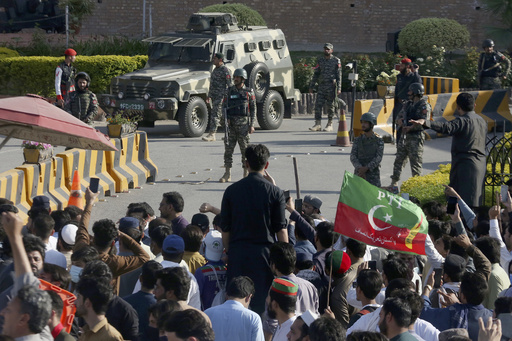
ISLAMABAD — The United States and the United Kingdom have raised significant concerns regarding the recent convictions handed down by military courts to 25 civilians associated with former Prime Minister Imran Khan. These individuals have been charged with involvement in riots that took place the previous year. This criticism echoes previous statements from the European Union and local human rights advocates who have also condemned these sentences.
The U.S. State Department voiced its unease over the military tribunal’s decisions, emphasizing the lack of judicial independence and due process typically associated with such courts. They remarked on Monday that these convictions stemming from the protests of May 9, 2023, raise serious concerns and urged Pakistan to uphold the right to a fair trial.
From the U.K., the Foreign Office expressed respect for Pakistan’s sovereignty concerning its legal matters. Nevertheless, they criticized the trial of civilians in military courts for its apparent lack of transparency and scrutiny, warning that it contravenes the fundamental right to a fair trial. They called on Pakistan to adhere to its commitments under the International Covenant on Civil and Political Rights.
These statements refer to violent incidents that erupted following Khan’s arrest in Islamabad in May 2023. Khan, who was unseated from power via a no-confidence vote in 2022, was subsequently convicted of corruption and sentenced to prison in August 2023. Since his conviction, he has remained incarcerated, while his party, the Pakistan Tehreek-e-Insaf (PTI), is engaged in negotiations with the government for his release.
In response to the mounting international disapproval, Pakistan’s Ministry of Foreign Affairs affirmed its dedication to fulfilling all international human rights obligations. In their statement, they asserted that the nation’s legal system aligns with international human rights standards and that the military court’s judgments were grounded in existing laws enacted by Parliament and supported by the Supreme Court’s interpretations.
Pakistan plans to maintain dialogues with international entities, including the European Union, to promote human rights without bias or double standards. On Monday, the 25 supporters of Khan received sentences ranging from two to ten years in prison, a move the military labeled as a “stark reminder” to deter lawlessness among the populace.
The PTI has publicly denounced the military courts’ convictions, insisting that any individuals involved in the alleged riots should face trial in the civilian judicial system. In a separate comment, Information Minister Attaullah Tarar accused the PTI of employing foreign lobbying groups for campaigns perceived as harmful to Pakistan, without addressing the international backlash regarding the convictions.
Additionally, Prime Minister Shehbaz Sharif’s administration has leveled accusations against Khan, accusing him of orchestrating the violent protests. Khan denies these allegations. Earlier this month, both Khan and numerous others were indicted in a civilian court for inciting unrest, specifically tied to the protests where demonstrators attacked military headquarters in Rawalpindi, overran an airbase in Mianwali in Punjab, and set fire to a Radio Pakistan building in the northwest region.

